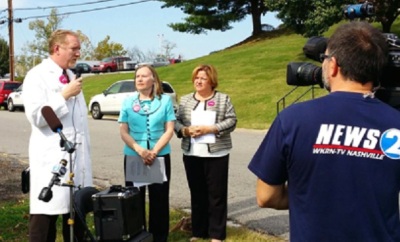Tennessee doctor says pro-choice physicians not upfront about risks of abortion

NASHVILLE, Tenn. (Christian Examiner) -- When doctors told Carmelle Hartgrove the odds of survival for the twin girls in her womb, she chose to gamble and won. The doctor claimed the girls had only a 30 percent chance of survival because they shared an amniotic sac and placenta, and recommended she abort one to save the other -- something she refused to even consider.
While the rare condition exists and the complications are real, the rate of death may have been overestimated, Dr. C. Brent Boles, a Tennessee obstetrician and gynecologist, told Christian Examiner.
Explaining there is risk one baby could get entangled by the other's umbilical cord and experience restricted oxygen and nutrients, Boles said it is not as high as many present it. "Textbooks state a high death rate of almost half the time, but if you break that down at 30 weeks gestation, 70 percent of babies will be okay," he said.
The process is like asking the mafia to police itself (asking abortionists to self-report medical complications arising from an abortion).
Citing his 23 years of experience, Boles, a volunteer spokesman for the Tennessee Right to Life, said he has only seen this condition once throughout the two decades of his private practice. That mother intentionally delivered at 35 weeks and both babies were fine, he said.
According to the Daily Mail, Carmelle Hargrove and her husband, Steve, learned of her condition at a 10-week prenatal visit. At that point doctors reportedly told the couple they could save one baby by aborting the other.
However, Boles believes such advice is not medical opinion but something more troubling.
"First, too many pro-abortion obstetricians will just casually recommend termination of a pregnancy because in their mind it's an easy solution to a problem," he exclaimed. "The second problem is doctors are not God and sometimes we are wrong about the things we recommend."
The Hartgroves had faith and relied on God's grace, and the babies were born at 32-weeks and weighing four pounds each. Now Charis Faith and Connie Grace are 20 months old and healthy, happy and growing.
"I look at them both now and think about what miracles they really are," their mother told the Daily Mail.
Yet the Hartgrove's miracle could have ended very differently if they had taken the physician's advice. According to Boles, the solution to abort one child was not without its own dangers.
"Because they shared the placenta as well as the sac, there was no way of (terminating) one without causing risk to the other baby as well," Boles said.
And too often the complications with such abortions are not explained.
Rattling off multiple examples of patients he's seen after experiencing complications with an abortion Boles said, "in my experience pro-abortion physicians, especially abortionist who do the procedures, do not give full and complete disclosure of all risks and potential outcomes of having an abortion."
Moreover, the problem is systemic he says.
According to Boles, the Center for Disease Control (CDC) reports abortions in the U.S. have a mere one percent rate of complications. However, he explained, that number is drawn exclusively from self reporting by abortion clinics that rarely see patients for a return evaluation.
Often, if complications arise, the patient will visit the emergency room or private physicians for medical attention from a problem with the procedure performed by an abortionist, he said.
"The process is like asking the mafia to police itself."